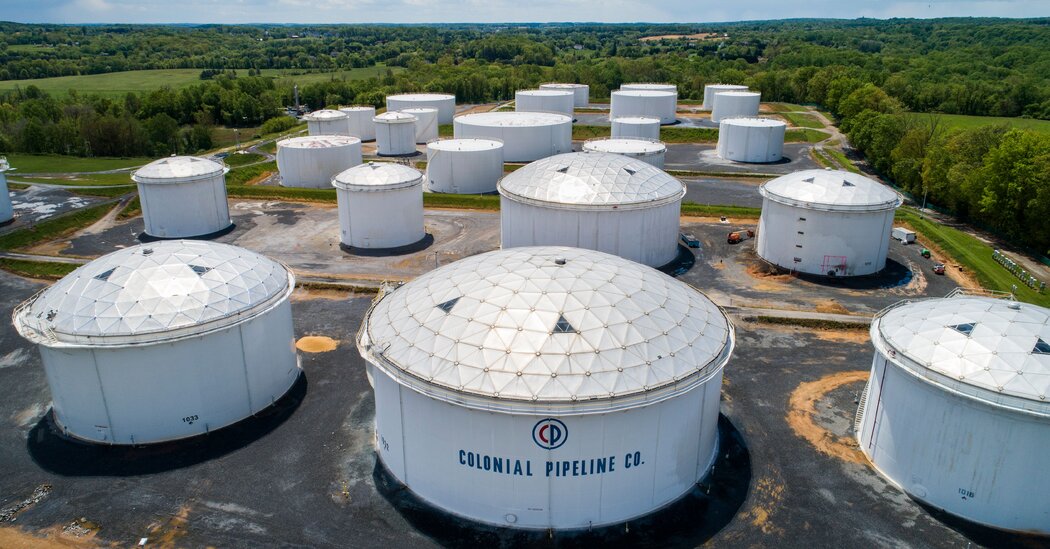Hacked Pipeline May Stay Shut for Days, Raising Concerns About Fuel Supply
HOUSTON — The operator of the largest petroleum pipeline between Texas and New York, which was shut down after a ransomware attack, declined on Sunday to say when it would reopen, raising concerns about a critical piece of infrastructure that carries nearly half of the East Coast’s fuel supplies.
While the shutdown has so far had little impact on supplies of gasoline, diesel or jet fuel, some energy analysts warned that a prolonged suspension could raise prices at the pump along the East Coast and leave some smaller airports scrambling for jet fuel.
Colonial Pipeline, the pipeline operator, said on Sunday afternoon that it was developing “a system restart plan” and would restore service to some small lines between terminals and delivery points but “will bring our full system back online only when we believe it is safe to do so.”
The company, which shut down the pipeline on Friday, acknowledged on Saturday that it had been the victim of a ransomware attack by a criminal group, meaning that the hacker may hold the company’s data hostage until it pays a ransom. Colonial Pipeline, which is privately held, would not say whether it had paid a ransom. By failing to state a timeline for reopening on Sunday, the company renewed questions about whether the operations of the pipeline could still be in jeopardy.
The shutdown of the 5,500-mile pipeline was a troubling sign that the nation’s energy infrastructure is vulnerable to cyberattacks from criminal groups or nations.
Energy experts predicted that traders would view the company’s announcement on Sunday as a sign that the pipeline would remain shut at least for a few days. Tom Kloza, global head of energy analysis at Oil Price Information Service, said he thought gasoline futures would rise 2 to 3 percent beginning Sunday night and Monday.
Nationwide, the AAA motor club reported that the average price of regular gasoline did not budge from $2.96 a gallon from Saturday to Sunday. New York State prices remained stable at $3, and in some Southeastern states like Georgia, which are considered particularly vulnerable if the pipeline does not reopen quickly, prices moved up a fraction of a penny a gallon.
The pipeline attack came at the beginning of the summer driving season, when fuel prices traditionally rise anyway.
“Even a temporary shutdown will likely drive already rising national retail gas prices over $3 per gallon for the first time since 2014,” said Jay Hatfield, chief executive of Infrastructure Capital Management and an investor in natural gas and oil pipelines and storage.
Goldman Sachs, in a report on Sunday, said that since there was no physical damage to the pipeline, higher fuel prices on the East Coast were “likely to be transient.”
Today in Business
Experts said several airports that depend on the pipeline for jet fuel, including Nashville, Tenn.; Baltimore-Washington; and Charlotte and Raleigh-Durham, N.C., could have a hard time later in the week. Airports generally store enough jet fuel for three to five days of operations.
White House officials held meetings on the pipeline attack over the weekend. The White House press secretary, Jen Psaki, said in a tweet that they are looking for ways to “mitigate potential disruptions to supply.”
To ease the impact, the Transportation Department on Sunday lifted some restrictions on the transport of gasoline, diesel and jet fuel by road to address what it called “emergency conditions.”
One reason that prices have not surged more so far is that the East Coast generally has ample supplies of fuel in storage. And fuel consumption, while growing, remains depressed from prepandemic levels.
Still, there are some vulnerabilities in the supply system. Stockpiles in the Southeast are slightly lower than normal for this time of year. Refinery capacity in the Northeast is limited, and the Northeast Gasoline Supply Reserve, a supply held for emergency interruptions, contains only a total of one million barrels of gasoline in New York, Boston and South Portland, Maine.
That is not even enough for a single day of average regional consumption, according to a report published on Saturday by Clearview Energy Partners, a research firm based in Washington. “Much depends on the duration of the outage,” the report said.
When Hurricane Harvey crippled several refineries on the Gulf Coast in 2017, suspending Colonial Pipeline flows of petroleum products to the Northeast for nearly two weeks, spot gasoline prices at New York Harbor rose more than 25 percent and took nearly a month to ease.
Regional refineries can add to their supplies from Kinder Morgan’s Plantation Pipeline, which operates between Louisiana and Northern Virginia, but its capacity is limited and it does not reach major metropolitan areas north of Washington, D.C.
The East Coast has ample harbors to import petroleum products from Europe, Canada and South America, but that can take time. Tankers sailing from the port of Rotterdam, the Netherlands, at speeds of up to 14 knots can take as long as two weeks to make the trip to New York Harbor.
Mr. Kloza said the Biden administration could suspend the Jones Act, which requires that goods shipped between American ports be transported on American-built and -operated vessels. That would allow foreign-flagged tankers to move additional barrels of fuel from Gulf ports to Atlantic Coast harbors. The Jones Act is typically suspended during emergencies like hurricanes.
“One could make the case that the Biden administration might consider such a move sooner rather than later if Colonial software issues persist,” Mr. Kloza said.






